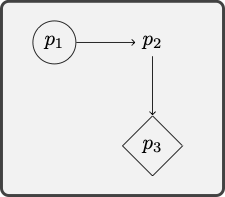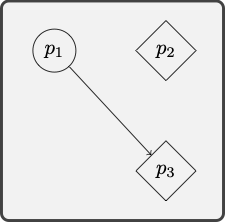7 Translation
We want to use the language of quantificational logic for the evaluation of natural language arguments. That will require us to be able to translate from natural language into the formal language of quantificational logic. We proceed in stages. We will briefly consider the case of predications, which are some of the simplest natural language sentences, and we will pay special attention to the translation of quantifier phrases.
A Translation Method
We build on the translation method we used for propositional logic. That is, we will first indicate how natural language sentences are constructed from simpler sentences by means of the usual propositional connectives. The difference is that we will now look for further structure into the sentences we would have formalized with the help of a propositional variable in propositional logic.
- Predication
-
We use predications to translate the most basic parts of the target sentence.
Consider the sentence:
Alice talked to the King, and the King talked to the Queen.
The translation method for propositional logic generates:
(Alice looked at the King
In a further step, we now make use of predicates and constants to translate the simplest sentences:
Translation key
Quantifier phrases require more discussion. We will look at the case of simple quantifier expressions such as ‘something’ and ‘everything’ and we will then move to more complex quantifier phrases such as ‘some apple’ and ‘every computer’, which require separate discussion.
- Quantifiers
-
We paraphrase the relevant sentences to make clear how they may be built from simpler constituents with the help of quantifiers such as ‘something’ and ‘everything’.
One may rephrase ‘Something is heavy’ as ‘Some thing is such that it is heavy’. The pronoun ‘it’ will rendered as a variable, which will be bound by the existential quantifier that corresponds to ‘something’. Consider the sentence:
Something is heavy.
We rephrase it with the help of a pronoun, which will eventually be replaced with a variable:
Translation key
Some thing is such that it is heavy.
Similarly for the sentence:
Everything is a material object.
We now rephrase it with the help of a pronoun, which will eventually be replaced with a variable:
Translation key
Every thing is such that it is a material object.
Similarly for predicates with more than one argument place:
Translation key
Something is south of San Francisco
Some thing is such that it is soutn of San Francisco.
- Common quantifier phrases
-
Common quantifier phrases combine a quantifier such as ‘some’ or ‘a’ and ‘all’ or ‘every’ with a monadic predicate such as ‘apple’ or ‘student’ as in ‘some apples’ or ‘every city’.
There are two main types of natural language sentence to consider:
Some apples are delicious.
All computers are expensive.
When the quantifier phrase combines ‘some’ with a monadic predicate, then we proceed as follows:
Translation key
‘Some apples
‘Some thing is such that it is an a apple and
Consider the sentence:
Some apples are delicious.
We now rephrase it with the help of a pronoun, which will eventually be replaced with a variable:
Translation key
Some thing is such that it is an apple and it is delicious.
Similarly for the sentence:
Translation key
Some city is south of San Francisco
Some thing is such that it is a city and it is south of San Francisco.
When the quantifier phrase combines ‘every’ or ‘all’ with a monadic predicate, then we proceed as follows:
Translation key
Every computer
Every thing is such that if it is a computer, then
Consider the sentence:
Every computer is expensive
We now rephrase it with the help of a pronoun, which will eventually be replaced with a variable:
Translation key
Every thing is such that if it is a computer, then it is expensive.
Similarly for the sentence:
Translation key
Every computer is connected to the network.
Every thing is such that if it is a computer, then it is connected to the network.
- Multiple Generality
-
Some predicates with multiple argument places may combine with more than one quantifier phrase:
Something is is south of San Francisco
Something is south of something
Some city is south of something
Some city is south of some city
Consider the sentence:
Something is south of something
We now paraphrase the sentence:
Translation key
Some thing
Consider now the sentence:
Some city is south of something.
We now paraphrase the sentence:
Translation key
Some thing
For yet another example, consider the sentence:
Some city is south of some city.
We now paraphrase the sentence:
Translation key
Some thing
Some sentences combine a universal and existential quantifier phrases.
Every student takes some course
Some student takes every course
Some course is taken by every student
Consider the sentence:
Every student takes some course
We now paraphrase the sentence in stages:
Translation key
Every thing
Every thing
Consider now the sentence:
Every student takes every course
We now paraphrase the sentence in stages:
Translation key
Every thing
Every thing
For another example, consider the sentence:
Some course is taken by every student.
We now paraphrase the sentence in stages:
Translation key
Some thing
Some thing
Issues with Translation
Translation into quantificational logic is subject to its own special difficulties. We distinguish at least two families of problems.
- Special Quantifier Phrases
-
Some quantificational structures pose special problems.
- A
-
A whale lives underwater
Quantifier phrases of the form ‘a
A whale lives underwater.
A student aced the midterm.
The first sentence is generally used to express a universal claim:
Translation key
A whale lives underwater.
Every thing is such that if it is a whale, then it lives underwater.
Translation key:
On the other hand, the second sentence is generally used to express an existential claim:
Translation key
A student aced the midterm.
Some thing is such that it is a student and it aced the midterm.
- Any
-
Any philosopher thinks.
The quantifier phrase ‘any’ may be translated with the help of a universal or an existential quantifier in different cases.
Compare the sentences:
Any philosopher thinks.
If any philosopher thinks, then Hegel does.
The first sentence invites the use of a universal quantifier.
Translation key
- Any philosopher thinks.
- Every thing is such that if it is a philosopher, then it thinks.
On the other hand, the second sentence suggests an existential quantifier:
Translation key
If any philosopher thinks, then Hegel does.
If some thing is such that it is a philosopher and it thinks, then Hegel thinks.
- Only
-
Only seniors are eligible for the prize
How should we paraphrase this sentence? Here is a suggestion:
Translation key
All eligible for the prize are students
Every thing is such that if it is eligible for the prize, then it is a senior
The interaction between quantification and negation requires some care as well:
Consider the sentence:
No student is eligible for the prize.
There is a choice between two equivalent interpretations. Consider, first, the sentence:
Translation key
Every student is not eligible for the prize.
Every thing is such that if it is a student, then it is not eligible for the prize.
For an alternative interpretation of the original sentence, consider:
It is not the case that some student is eligible for the prize.
It is not the case that some thing is such that it is a student and it is eligible for the prize.
- Structural Ambiguity
-
A sentence may be structurally ambiguous.
Consider the sentence:
Everything has a cause
There is a choice between two non-equivalent interpretations:
Translation key
Every thing is such that it
Every *thing
The alternative interpretation proceeds as follows:
Translation key
Some thing
Some thing
The distinction is specially important when it comes to the evaluation of an argument such as the following:
- Everything has a cause.
- If everything has a cause, then God is the cause of everything.
- God is the cause of everything.
The crucial observation is that premise two is plausible on one but not the other interpretation of the first premise.
Consider the sentence:
Every student registers for some course
There is a choice between two non-equivalent interpretations:
Translation key
Every thing
Every thing
The alternative interpretation is this:
Translation key
Some thing
Some thing
We are in a position to combine the skills we have gained in order to determine whether an argumnet formulated in English exemplifies a valid quantificational form.
Example 7.1 Consider the argument:
- All physicists admire Newton.
- Newton admires some mathematicians.
- So, some physicists admire some mathematicians.
We first translate the argument into the language of quantificational logic:
Translation key
The next step is to search for a model in which the premises are true and the conclusion false:

Example 7.2 Consider the argument:
- Some LA landmark is moore beautiful than some NY landmark.
- The Griffith Observatory is an LA landmark and Times Square is a NY landmark.
- So, the Griffith Observatory is more beautiful than Time Square.
We first translate the argument into the language of quantificational logic:
Translation key
The next step is to search for a model in which the premises are true and the conclusion false:

Exercises
Translate the following sentences into the language of quantificational logic.
Some Trojans fear Achilles, but Achilles fears every Trojan.
All Trojans are courageous.
Only Trojans come from Troy.
No Greek comes from Troy.
Achilles fears Paris, but Paris fears no one.
Some Greeks fears some Trojans, and some Trojans fear some Greeks.
Assess the following arguments for quantificational validity.
All poisonous frogs are amphibians. Kermit is a posisonous amphibian. Therefore, Kermit is a frog.
Aristotle admired anyone who taught for free. Socrates taught for free, but no sophist did ever teach for free. So, Aristotle did not admire a sophist.
No weekday comes after Saturday. Monday is a weekday, but Sunday is not. Therefore, Monday does not come after Sunday.
Some cube is green all over and some cube is red all over. No cube is both green all over and red all over. Some sphere is green all over. So, some sphere is not red all over.
No Trojan fears Achilles, but Achilles fears some Trojans. Paris is a Trojan. So, Achilles fears Paris but Paris does not fear Achilles.
Some stadium is close to University Park. The Coliseum is a stadium. Therefore, the Coliseum is close to University Park.
Los Angeles is connected by direct flight to London. London is connected by direct flight to every major European city. Barcelona is a major European city. Therefore, Los Angeles is connected by direct flight to Barcelona.
All Greeks feared Hector or Paris. Paris feared no Greek who feared Hector. Therefore, some Greeks feared Paris.